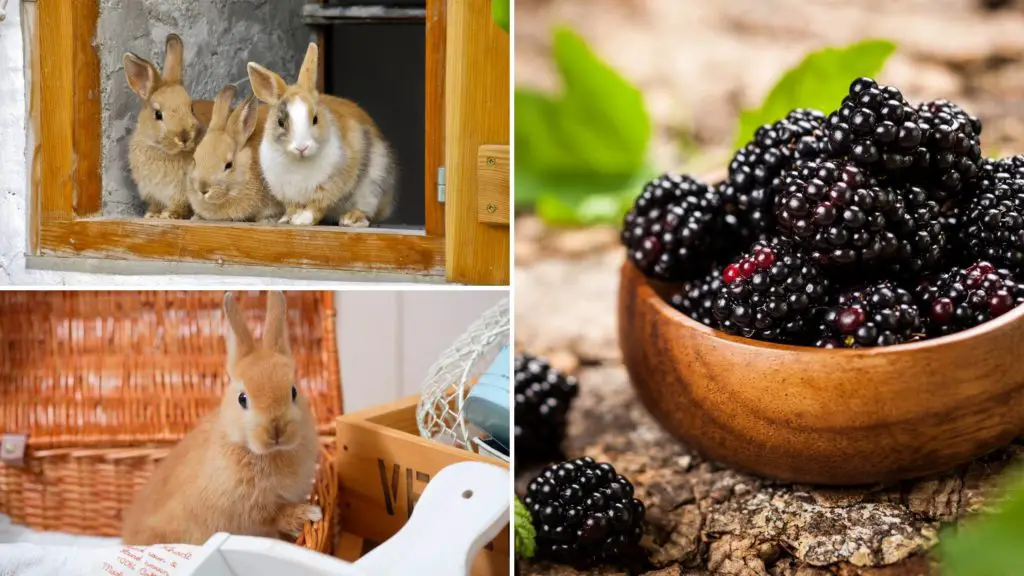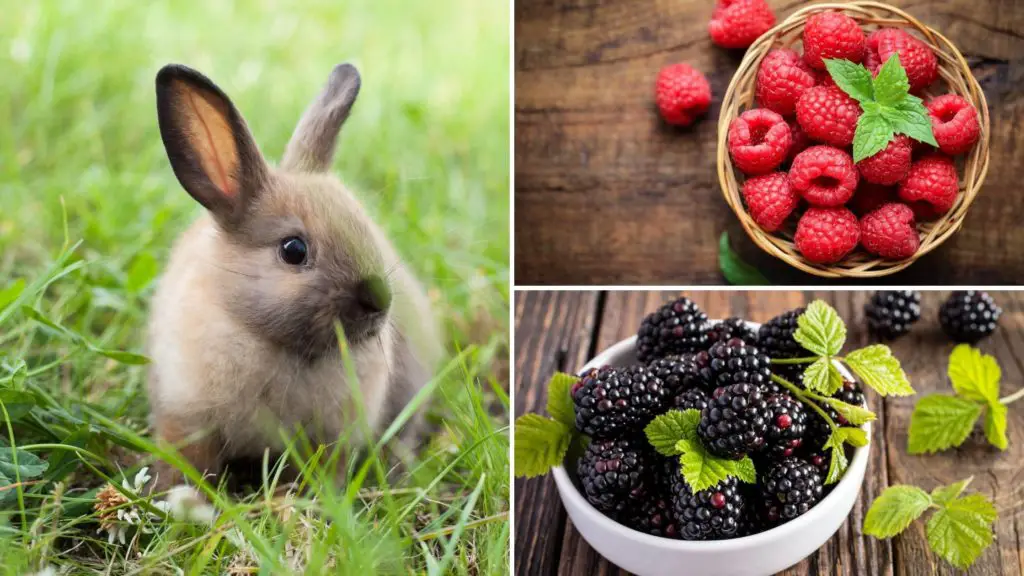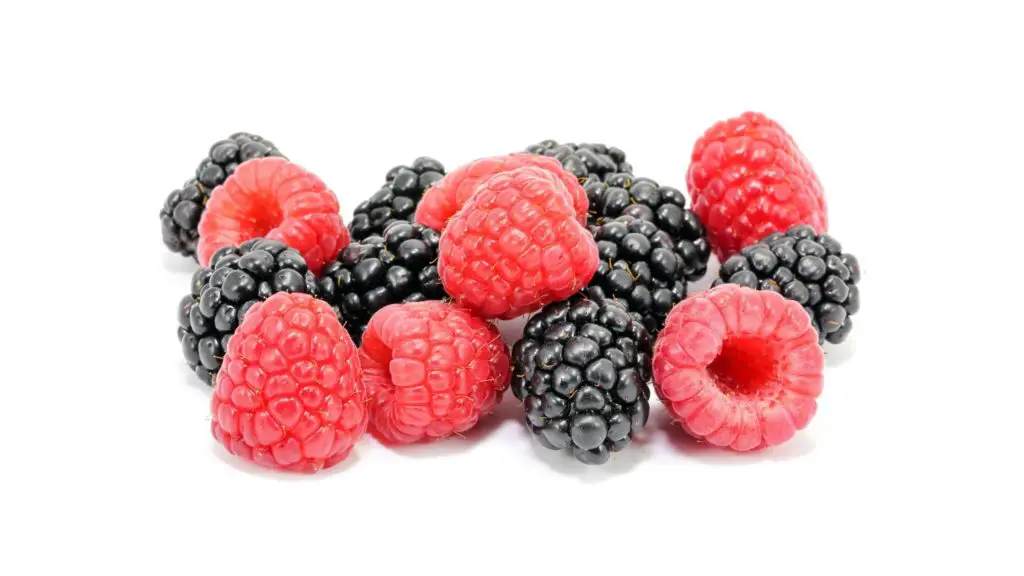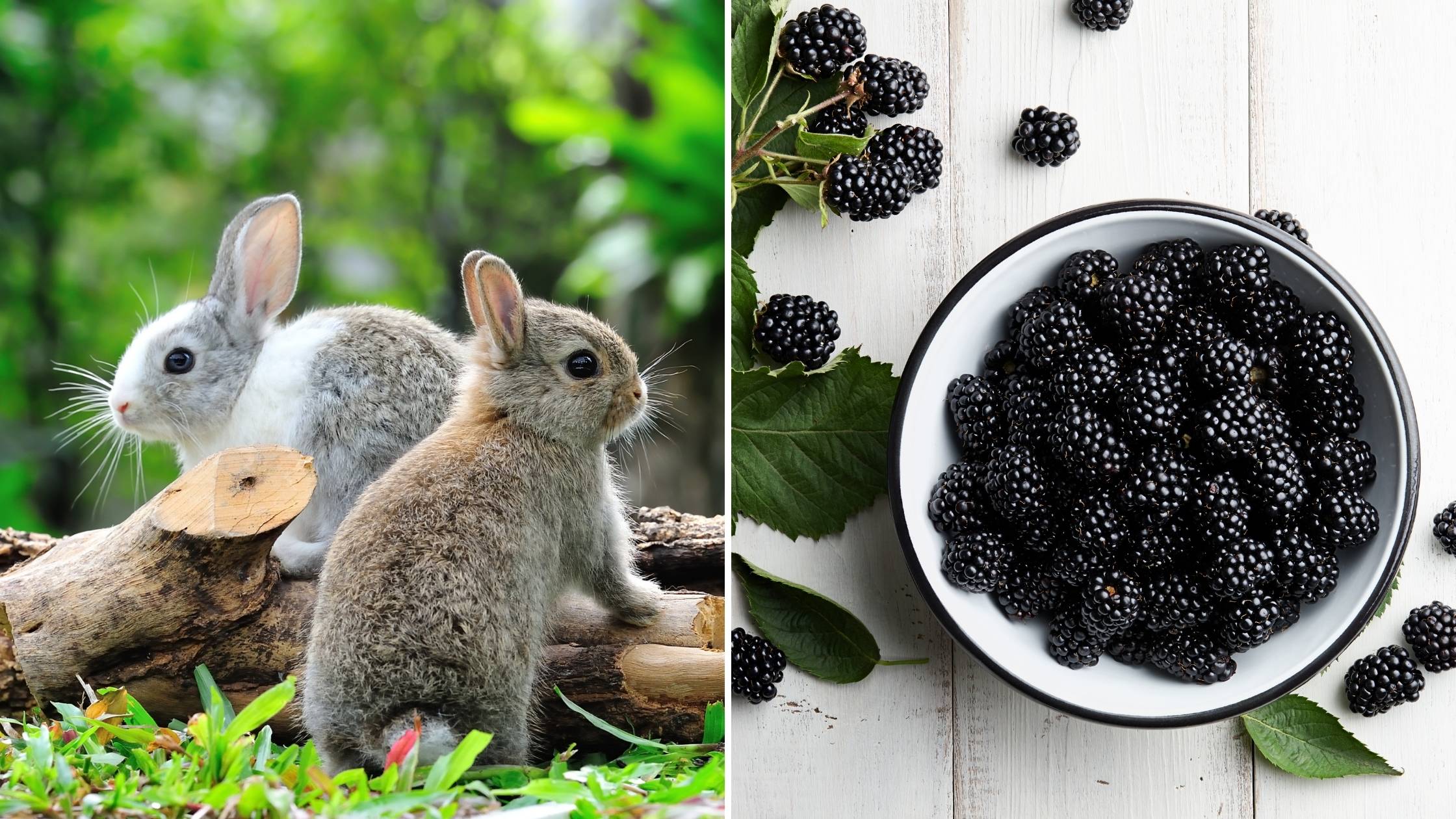Last Updated on 05/22/2021 by Veronica Jones
Rabbits are very playful and active animals, and there’s nothing better than maintaining a well-rounded diet to keep them in top shape. There are many misconceptions about what rabbits should eat. Contrary to popular belief, rabbits need to eat more than just carrots and lettuce. Aside from the usual rabbit pellets, grass, hay, and leafy vegetable combo, It’s best to provide a more limited supply of other vegetables and fruits. So, can rabbits eat blackberries? Let’s find out…
Can Rabbits Eat Blackberries?
YES, Rabbits can eat Blackberries, but in moderation. Rabbits have very sensitive digestive tracks so, when you introduce a new food, always do so slowly. To avoid upsetting their digestive tract.

How much should I feed them?
Since Blackberries and Raspberries are fruits, they should only be given once or twice a week and in small amounts, think of it as a special treat. Always remove seeds and pits because some have hulls that can be hard to digest and can cause life-threatening intestinal blockages.
Be very mindful not to overdo these treats, as they can promote intestinal problems and it can cause a rabbit to eat treats instead of its normal diet. And fruits should not be fed to an overweight rabbit.
Health benefits rabbits get from Blackberries and Raspberries:
- Great source of Magnesium
Magnesium is responsible for metabolic reactions. It also offsets calcium to prevent the occurrence of blood clots and helps produce energy, promoting your rabbit’s activeness.
- Rich in Antioxidants
Including fruits in your rabbit’s diet, such as raspberries, can help reduce the risk of the cell damage caused by free radicals and antioxidants are good in fighting off these free radicals.
- Protein
Protein is necessary for building muscles and enzymes which a growing rabbit needs for their bodies. Rabbits use chemicals called amino acids to make the proteins they need. They get these amino acids from breaking down proteins in the food they eat. If a rabbit can’t make enough of the right proteins, it will struggle to grow and be healthy.
- Fiber
Adding fiber to their diet helps food move down the intestines before it is pooped out. But rabbits need a lot more. The digestive system of rabbits is very sensitive – without enough fiber, it clogs up. Fiber helps keep everything moving. For a rabbit, constipation can be fatal.
- Fat
Rabbits need a lot of energy for their bodies – and fats are high in energy, there is twice as much energy in fat compared to the same weight of carbohydrates. They also need fats to help absorb some of the vitamins their body needs. Vitamins A, D, E & K are all soluble and dissolve in fats, so having a little fat in the diet helps their body to get these essential vitamins.
- Copper
Copper helps the rabbit make hair, and regulate how the body uses iron, and creates energy. If they don’t get enough they may suffer from dermatitis, anemia, and bone marrow problems.

- Iron
Rabbits need iron to help make blood. Red blood cells are made up of hemoglobin, a complex protein connected to an iron complex. The normal amount of iron in a rabbit’s blood is 33-40 mmol/liter.
- Manganese
This is necessary for bone development, they need at least 0.3 mg of manganese per rabbit per day to meet normal requirements.
- Vitamins
Vitamin A
Also called retinol keeps their bodies healthy. It is important for their immune system and skin. Bunnies also use vitamin A to keep their eyes healthy in a poor lighting environment.
Vitamin K
Is a fat-soluble vitamin that keeps their blood from clotting. Without vitamin K, a tiny wound could continue to bleed. Rabbits can produce most of the vitamin K they need themselves, but occasionally, for example, if a rabbit is pregnant they may benefit from additional vitamin K. But too much vitamin K could affect their kidneys, so it’s best to regulate their intake.
Vitamin D
Helps to make sure that rabbits have the right amount of calcium in their bloodstream, and regulates whether there is too much that needs to be excreted out. Vitamin D also controls their phosphorus uptake.

Can baby rabbits eat blackberries and raspberries?
NO, don’t feed baby rabbits berries at a very young age, it’s best to get their nutrients from their mother’s milk for 8 weeks.
Is it safe for them to eat blackberry and raspberry leaves as well?
Definitely! For as long as you know whether they are pesticide-free. It’s better to grow them in your own backyard just to be safe.
Can blackberries and raspberries make my rabbits sick?
Not in moderation but too much of these fruits can interfere with the digestive tract which is very sensitive. Too much of anything is never good.
Which vegetables should be included in their diet?
Since we are already on the topic of safe food that rabbits can eat. Rabbit gets a lot of nutrient intake from vegetables. Always make sure vegetables are free from harmful chemicals like pesticides and are cleaned and rinsed before you feed them to your pet. Try providing vegetables that have dark leaves, they contain more nutrients. Try not to feed them vegetables that are new to them because some vegetables can cause rabbits to produce soft stools, so be sure to introduce new vegetables to their diet one at a time.
Food that is unsafe to eat for rabbits.
Rabbits are herbivores, they primarily eat plant material, however will also consume an omnivorous diet like fungi, roots, tree bark, fruits, snails, and worms. But some fruits and vegetables are harmful to rabbits.
Can I only feed them pellets for rabbits?
Rabbit pellets are widely available in different pet shops and or pet stores, but pellets were originally made for rabbits grown by agricultural producers and not for pet rabbits. Though, it is safe to feed them pellets, make sure they are fresh and of high quality. They can be part of a healthy diet for rabbits but they should not be the only source of nutrients for them, pellets contain high calories and can lead to obesity.
What should go into the perfect diet for rabbits?
Rabbits eat a variety of grass to keep their digestive tract in top shape. So, what should be the perfect meal plan for your rabbit?
Hay
The staple food in their diet. Long-stemmed fibers make up 80 to 90 percent of their diet. There are different types of hay and the best ones for them are Timothy, Orchardgrass, Brome, and Oat hay.
Always make sure to buy the freshest batch to avoid molds and dust that could make them sick.
Pellets
Should be fed in small quantities. An average adult size rabbit should only be given a one-quarter cup of pellets daily. Don’t buy pellets that have nuts, dried corn, and seeds added.
Vegetable
Their favorite food and should be fed no more than two cups daily for adult rabbits. Other breeds that are under five pounds should only get one cup daily.
Fruits
An occasional treat for them. Fruits should be given one or two times a week.
Water
And of course, rabbits need to stay hydrated. They should always have unlimited access to fresh water which should be changed daily.
So there you have it, always double-check everything that goes into their feeding bowl to keep them healthy and active.

